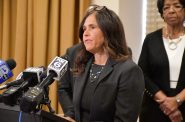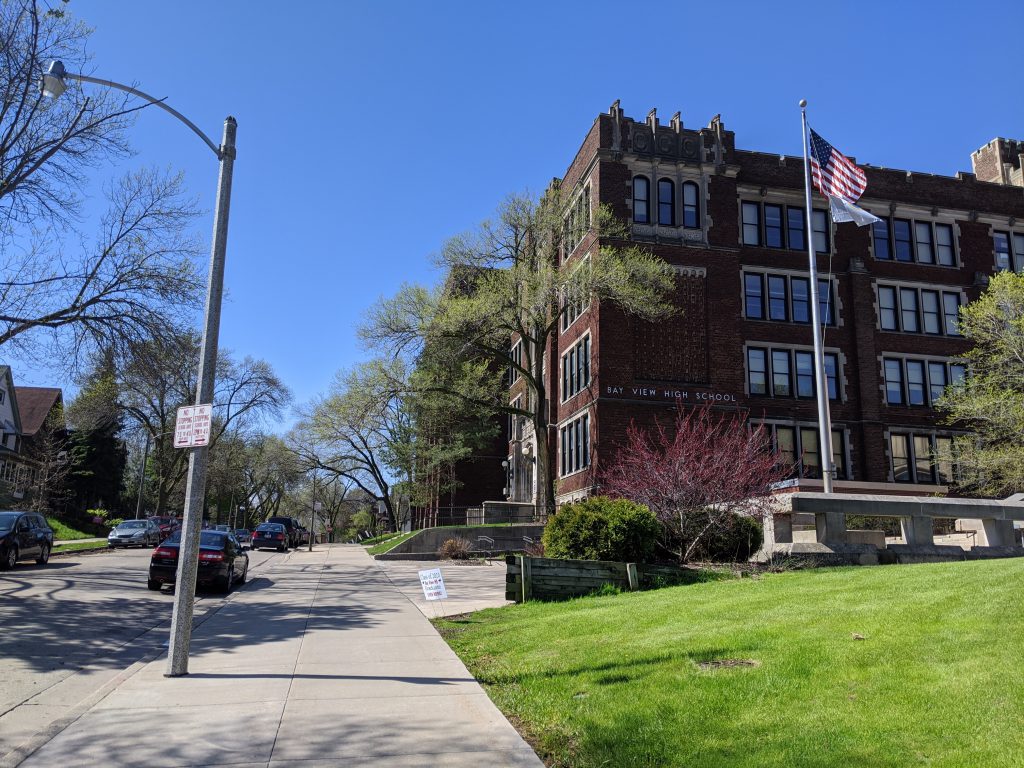MPS Has Mixed History With Police Officers in School
Decision looms about what to do with state-mandated return of school resource officers.
At an Oct. 22 school board committee meeting, Interim Superintendent Eduardo Galvan stated “MPS is ready to accept SROs as soon as they are available as MPS does not hire police officers.”
With the 2023 Act 12, Milwaukee Public Schools were required to place 25 School Resource Officers (SRO) into its schools. However, the new law identified no funding for SROs, nor where the officers would come from. For months, the city, the police department and MPS along with the city attorney, have gone back and forth on who had responsibility for what.
Act 12 states “Beginning January 1, 2024, … not fewer than 25 school resource officers are present at schools within the school district during normal school hours and that school resource officers are available during before-school and after-school care, extracurricular activities, and sporting events as needed.” The law, which provided the city with a sales tax and boosted local government funding statewide, also requires that all SROs “complete the 40-hour course sponsored by the National Association of School Resource Officers.” However, MPS has no control over police officer training. Up to this point, the district and the city only had a barebones agreement with the details to be worked out.
At the MPS committee meeting, Assembly Representative Ryan Clancy (D-Milwaukee) said what the school board should do: “This provision was written in a way that you can and should ignore it. There are no teeth. There are no specific timelines and there is no funding. So, what I am asking you to do today is uplift what the students behind me and teachers and what other community members have said, and do nothing. Wind down the clock until the legislators can do the right thing and undo the harm that has come from Act 12.”
The Wisconsin Institute for Law & Liberty (WIL) filed a lawsuit against MPS for failing to provide the required SROs in a timely manner.
During the public testimony on October 22, only one individual spoke in favor of SROs.
Malcolm Hunt, a Black religious minister, retired MPD police officer and parent of two MPS students said: “If you don’t want police in your schools, do not do anything that will cause the teachers to call the police to your schools,” as he spoke to the students in the auditorium. “These schools are out of control. Kids are running in the hallways… Most of all, you need to bring God back into the schools.”
Amber West, high school organizing manager for Leaders Igniting Transformation (LIT) said: “MPS has not had a mass shooting. All high schools experience fights, vandalism and bad behavior because that is what teenagers do.” LIT students cited research on SROs that has shown that it is counterproductive, rarely improving school order but increasing student arrests and increasing the possibility that the impcated students would be burdened with a criminal record. Other teachers and parents supported the statements.
MPS’ previous experience with SROs matches the LIT statements.
“Beginning in school year 2007-08 (SY 2008), Milwaukee instituted its SRO program by assigning SROs in pairs to a small number of particular schools in the city (Bradley Tech High School, and a cluster of schools near Custer High School), then expanded placement of officers to a handful of additional schools,” says a 2018 district-commissioned report. “After a few years of experience with the program, some concerns were identified. One concern was the need to cover incidents that occurred in other schools. Another issue was that, in some cases, SROs were used by administrators to enforce school rules. It was noted that the way some of these cases were handled, officers ended up making arrests as the situations escalated; arrests in schools increased.”
John Rosiak, the principal investigator, stated “The National Association of School Resource Officers (NASRO), in a policy statement, says that best practices clearly define the roles of the SRO to include those of: law enforcement officer, teacher or informal counselor. NASRO and the federal Community Oriented Policing Services (COPS) Office have traditionally defined these three functions as the ‘triad’ roles of the SRO.”
But just like national studies have found, Rosiak discovered “SROs were used by administrators to enforce school rules. It was noted that the way some of these cases were handled, officers ended up making arrests as the situations escalated; arrests in schools increased. The response agreed upon by the leadership of the school administration and police department to address this increase in arrests at schools was to remove the SROs from the particular schools in school year 2012-13 and to deploy them in ‘mobile’ fashion throughout the city. The ‘mobile’ approach was implemented to allow more schools to be covered by SROs. The idea was that if the officers were not present full-time in the schools, then arrests would go down.”
However, SROs were no longer providing the triad of services but simply acting as police on patrol.
The Milwaukee Police Department tried to provide counseling through, “Students Talking it Over with Police” (S.T.O.P). But, instead of bridging the gap between students and police, an analysis done by a task force found that the program reinforced the concept that police are usually right and students need to comply with officers.
Rosiak made a series of recommendations to save the MPS SRO program, but acknowledged it came with a hefty price tag. The district terminated all contracts with MPD on June 18, 2020.
Rosiak Associates, LLC, lists a series of best practices to make schools safer including proper use of SROs. However, a recent study headed by Ben Fisher, UW associate professor of Civil Society & Community Studies, found that “when we have police in schools, they’re not providing benefits for school safety, they’re not reducing crime, they’re not reducing violence — but they are escalating the punishment of students, especially through things like suspension.” SROs may make sense in theory but not in practice.
If you think stories like this are important, become a member of Urban Milwaukee and help support real, independent journalism. Plus you get some cool added benefits.
More about the MPS School Resource Office Debate
- Assembly Passes Bill That Adds Penalties, Definitions to Police-in-MPS Policy - Anya van Wagtendonk - Mar 14th, 2025
- Rep. Donovan’s Public Safety Bills Pass Assembly - State Rep. Bob Donovan - Mar 13th, 2025
- Council Approves MPS Police Officer Agreement, But Money Still An Issue - Jeramey Jannene - Mar 4th, 2025
- Judge Fines City For Failing To Comply With MPD in Schools Requirement - Jeramey Jannene - Feb 27th, 2025
- City Requests Delay for Police in Schools - Jeramey Jannene - Feb 26th, 2025
- Judge Rules MPS, City Must Split School Police Costs 50/50 - Graham Kilmer - Feb 17th, 2025
- Murphy’s Law: MPS, City Feud Over Paying School Resource Officers - Bruce Murphy - Feb 12th, 2025
- Judge Rules MPS Must Bring Police Officers Into Schools - Jeramey Jannene - Jan 23rd, 2025
- K-12 Education: Studies Show Police in Schools Don’t Make Them Safer - Terry Falk - Jan 20th, 2025
- Mayor Wants MPS To Pay For Police in Schools - Jeramey Jannene - Jan 14th, 2025
Read more about MPS School Resource Office Debate here
K-12 Education
-
MPS Training in Science of Reading Going Poorly
 Nov 23rd, 2025 by Terry Falk
Nov 23rd, 2025 by Terry Falk
-
The Fear Factor at MPS
 Nov 11th, 2025 by Terry Falk
Nov 11th, 2025 by Terry Falk
-
MPS Reaching Out to Community
 Nov 2nd, 2025 by Terry Falk
Nov 2nd, 2025 by Terry Falk






















